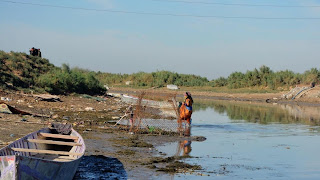Canada Promises to Preserve the Mesopotamian Marshlands in Iraq
This month, the Department of Foreign Affairs, Trade and
Development (DFATD) of Canada and the United Nations Development Program (UNDP)
in Iraq signed an agreement for a project to protect Iraq's southern
Marshlands, with a CAD 5 million (roughly US$ 3.7 million) contribution to
increase biodiversity protection and human resilience to climate change.
The Center for Restoration of Iraqi Marshes & Wetlands
(CRIMW) within the Ministry of Water Resources of Iraq will oversee the
project's execution.
The legendary Marsh Arab civilization of Iraq is found in
the Iraqi Mesopotamian Marshlands, one of West Asia's most significant hotspots
for biodiversity and a UNESCO World Heritage site. However, the marshlands are
now in danger due to climate change and irresponsible human activity.
Severe droughts, rising temperatures, decreased
precipitation, and higher evaporation rates have an impact on the distinctive
marsh ecosystems. In addition to the effects of climate change, habitat
destruction, chemical and wastewater pollution, and human influence on river
flow all reduce the resilience of ecosystems and biodiversity in the Marshes.
Due to their intimate connection to nature, the original
inhabitants of the Mesopotamian Marshlands, especially women and girls, are among
the first to experience the negative effects of climate change and ecological
degradation.
In order to reduce poverty, promote social cohesion, and
mitigate climate change, a set of project-recommended activities aims to
strengthen the resilience of local communities to the effects of climate
change, particularly indigenous Marsh women. It also seeks to address the root
causes of biodiversity degradation and protect the wildlife population.
The initiative will place a special emphasis on investing
in the empowerment of Marshland women, enhancing their involvement in
decision-making processes, and encouraging them to become change agents in the
Marshlands, particularly in the setting of southern Iraq where gender inequity
is severe.
The project will increase local water security by
restoring water recycling systems, outfitting them with solar energy units, and
conducting an extensive analysis of potential solutions for securing drinking
water for the Marshes population that are sustainable and scalable in the long
run. This is due to the severe water scarcity.


Comments
Post a Comment